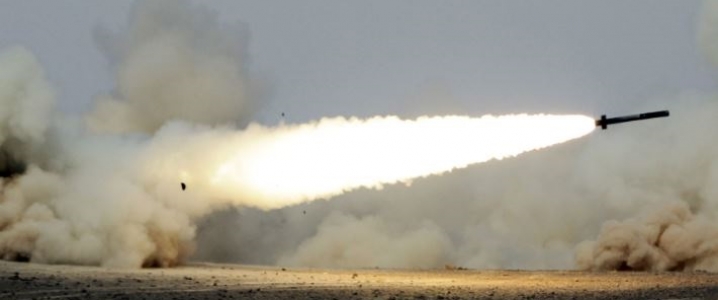Houthi rebels in Yemen claim to have fired two ballistic missiles toward an oil facility in the southern Saudi city of Jizan, close to the border with Yemen, Houthi-controlled Saba news agency reports.
According to Saudi Arabia-owned Al Arabiya news outlet, Saudi air defense forces have destroyed a ballistic missile fired by the Houthis from Yemen that targeted the Saudi border city of Najran.
The Iran-aligned Yemeni rebels, who have been fighting a Saudi-led Arab coalition in Yemen since 2015, have fired or claimed to have fired many missiles on Saudi Arabia since then, but they have caused little damage, and many of those missiles have been intercepted by the Saudi military.
Al Arabiya reported today that an Arab coalition strike hit the presidential office in Yemen’s Houthi-led capital. The strikes came hours after Saudi Arabia had intercepted two ballistic missiles launched by the Houthis and targeting the south of the Kingdom, according to the Saudi outlet.
The strikes left at least 6 dead and 30 wounded on Monday, the Associated Press reported, citing health officials.
In recent weeks, the conflict looks to have escalated, with Houthis firing ballistic missiles over Riyadh, in retaliation for air raids by a Saudi-led coalition. The Royal Saudi Air Defense intercepted at least one ballistic missile over Riyadh in that attack. Related: Never Trust A Banker About Oil Prices
Before that, the Houthi movement claimed to have fired a ballistic missile targeting Saudi Aramco in the southern Saudi province of Najran. Aramco responded to the reports by saying that all oil and gas facilities, plants, and refineries in Saudi Arabia were operating normally.
Reports from Saudi media two weeks ago had it that the Houthis had captured 19 oil tankers and are keeping them from entering the Hodeidah port.
A possible further escalation of the Saudi-Iran proxy war in Yemen is one of the geopolitical risks in the Middle East that could add premium to oil prices. The other—more imminent—geopolitical concern is Iran, with May 12 the deadline for U.S. President Donald Trump to decide whether to waive sanctions on Iran.
By Tsvetana Paraskova for Oilprice.com
More Top Reads From Oilprice.com:
- WTI Breaches $70 On Iran, Venezuela Fears
- Is This The End Of Diesel Trucks?
- The Next Big Trend In Offshore Oil & Gas



















However, the risk for oil prices could come from the rising geopolitical concern over the Bab
el-Mandeb Strait at the southern tip of Yemen. If one Saudi oil tanker is hit or sunk, this will deter many oil tankers from using the Strait thus leading to disruption of oil supplies to Europe and rising oil prices.
Saudi Arabia is well advised to de-escalate tension in Yemen and try to reach a peaceful settlement with the Houthis. This will save the Yemeni people from the misery of the war, save the Saudi budget more than $76 bn annually in war costs and eliminate the risk to oil tankers passing through the Bab el-Mandeb Strait.
As a historical note, when the British Empire occupied Aden in the 19th century, it did not endeavour to occupy Northern Yemen judging that it is virtually impossible to control it given its mountainous topography. The Late Gamal Abdul Nasser of Egypt lost some of his best troops in Yemen defending the republican regime. That was a major contributing factor for his defeat in the 1967 war with Israel.
Dr Mamdouh G Salameh
International Oil Economist
Visiting Professor of Energy Economics at ESCP Europe Business School, London